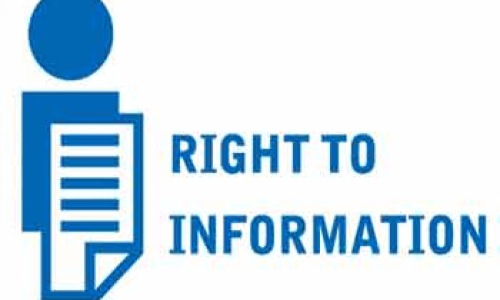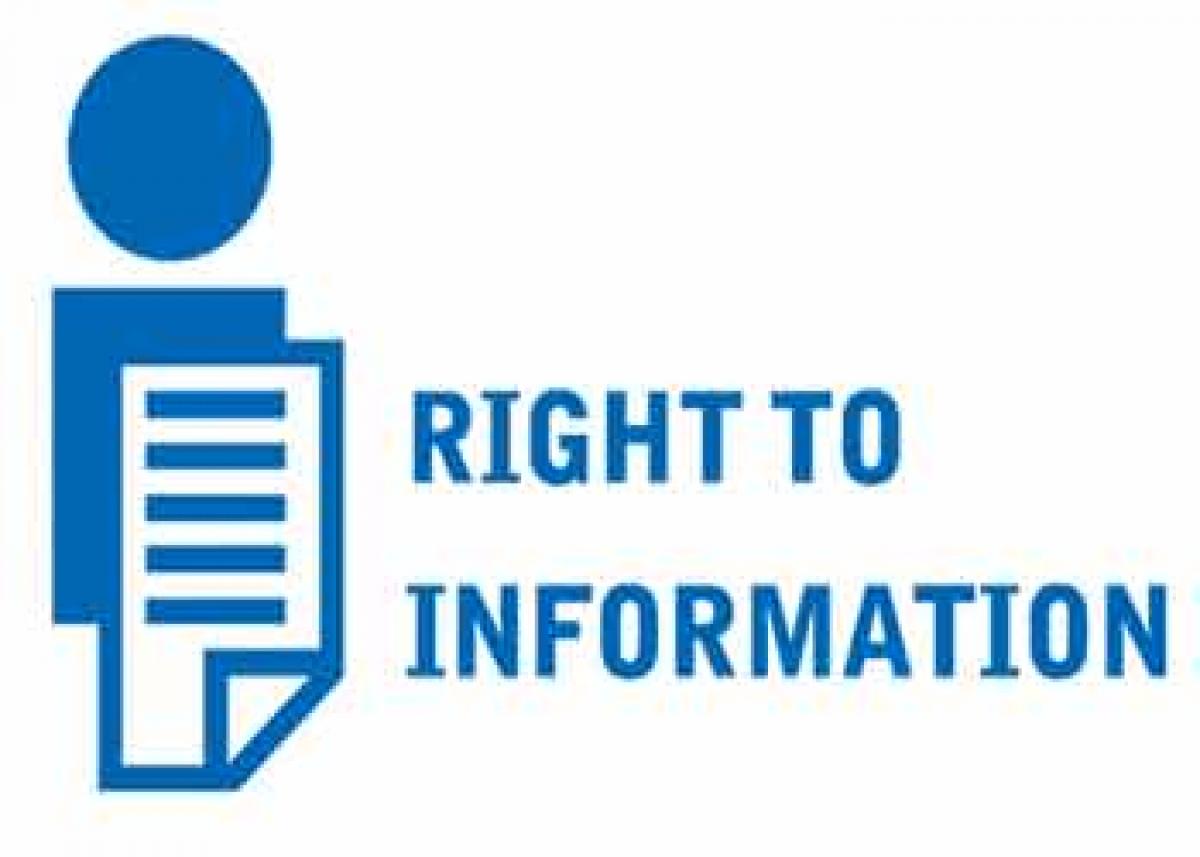Live
- Sensex, Nifty drift lower on profit booking
- Jagan treated cadres as ‘subordinates’, alleges Grandhi
- Mpower’s survey on edu loans
- IIP growth falls to 3.5% in Oct
- Easing food prices lower retail inflation to 5.48% in November
- Space allocation for packaging units at MSME parks on anvil
- Maha Kumbh: Yogi reviews preparations
- Gadkari on accidents: I try to hide my face in meetings abroad
- Abetment of suicide: Mere harassment not sufficient to find accused guilty says SC
- 6.79L homes to receive water under Amrut-II
Just In

An example to show how not to file an RTI request came to CIC. These are the cantankerous points in brief of an RTI application by a disgruntled employee who was facing an inquiry for misconduct.When Mr X, LDC, was posted in a government hospital,
 An RTI request from an UDC of government hospital in New Delhi is a bad case of appeal. It’s a repeated appeal, which causes wastage of time of public authority and the Central Information Commission (CIC). He is a misuser and his malicious intention is to threaten and stall inquiry against him and employees like him for all times to come.
An RTI request from an UDC of government hospital in New Delhi is a bad case of appeal. It’s a repeated appeal, which causes wastage of time of public authority and the Central Information Commission (CIC). He is a misuser and his malicious intention is to threaten and stall inquiry against him and employees like him for all times to come.
The vigilance cell has investigated against him. He is seeking all papers about the service and leave of officers who were witnesses who deposed against him in inquiry. This RTI is a serious threat to the process of inquiry
An example to show how not to file an RTI request came to CIC. These are the cantankerous points in brief of an RTI application by a disgruntled employee who was facing an inquiry for misconduct.When Mr X, LDC, was posted in a government hospital,
New Delhi, and what were the duties assigned to him from time to time in each section during his entire posting in the hospital till his compulsory retirement? Please supply the certified copies of the posting orders, assignment of duties and relieving orders?
Who was the appointing authority and disciplinary authority in the case of Mr X and since when he was removed from services? Please supply the certified copies of the same. He also asked about leave account of an UDC.Similar points of information were asked about an UDC, two DDOs and several other officers of the hospital.
Another peculiar demand is: Disclose names and designations of authorities who had passed posting orders of nursing orderly/ LDC/ cashier to collect prescribed fee of colour Doppler and USG in the Radiology Department from time to time and supply the certified copies of the orders with postings details of each nursing orderly, LDC and cashier from time to time in terms of the Receipt & Payments Rules, 1963 and under which section these postings were made?
Provide the details of cash receipt, amount deposited by nursing orderly /LDC to the cashier during the period 2007-2008, 2008-2009 and 2009-2010 in a particular format.Then another set of questions asked by the petitioner was about inquiry against his alleged misdeeds. Supply the certified copy of the Preliminary Inquiry Report (against him, who was a DDO).
Give special audit report given against him. Give a copy of report against Mr X, LDC, for alleged embezzlement, copy of report containing adverse comments against him. He sought several other aspects of information regarding handing and taking over of incomplete cash book, and raised certain questions demanding some answers.
He wanted papers relating to duties of ten medical staff and para-medical staff members like doctors, deputy medical superintendent, accounts officer, nurses and pharmacists, who gave witness against him. This is not the way the Right to Information should be exercised.
The Central Public Information Officer (CPIO) sought copying cost of Rs 4,080, which appellant paid. Around thousand papers were given. Still the first appellate authority arranged information on certain points.
Undoubtedly, it is a bad case of RTI appeal. It’s a repeated appeal, which causes wastage of time of public authority and the Central Information Commission (CIC). He is a misuser and his malicious intention is to threaten and stall inquiry against him and employees like him for all times to come.
The vigilance cell has investigated against him. He is seeking all papers about the service and leave of officers who were witnesses who deposed against him in inquiry. This RTI is a serious threat to the process of inquiry.
He is trying to avoid inquiry and witch-hunt the complainants and witnesses. He is not sparing officers who ordered inquiry or conducting inquiry or those just do not agree with him. The appellant posed a challenge to the conduct of the inquiry against him but also against the system of inquiry itself.
If this RTI appeal is allowed and appellant is allowed to have this information, none will complain against misconduct and indiscipline if any. Such a misuse will affect the administration seriously.
It is totally motivated by the personal vengeance. Complaints, witnesses and inquiry officers are under threat of such misuse, which will surely impede the process of investigation. Section 8(1)(h) of the RTI Act states that: “Information, which would impede the process of investigation or apprehension or prosecution of offenders.”
This is a most dangerous misuse of the RTI Act which should never be encouraged. If the appellant believes that he is innocent, he should be given every chance by the Inquiry Officer to defend himself. If he is not given the chance, he has every right to avail the legal remedies available to him under law. But he choose to come through the RTI route to misuse the access to information to stall the inquiry.
The PIO is directed to put up the RTI request, copy of his first appeal and second appeal of the appellant, before the Inquiry Officer for his consideration. The respondent authority should frame a policy to prevent such misuse of RTI against the inquiries /process of taking disciplinary action, questioning the misconduct and inquiring into several other charges within reasonable time.
The charged employees should necessarily appear before inquiry proceedings, without threatening witnesses, complainants and others which impede the inquiry. The Commission earlier rejected a similar appeal by the same appellant on July 6, 2015, observing it as abuse of RTI. He should have appeared before the inquiry committee and presented case. Instead he is resorting to misuse of RTI.
The Commission disposed of his earlier appeal for such mischievous request for information. Deputy Secretary (vigilance), Dte. of Vigilance, GNCT of Delhi, informed that the inquiry in the vigilance case has been completed and the case is under consideration of competent authority for final action against the appellant.
In the absence of public interest, the RTI request becomes a frivolous exercise and result in the harassment of the officers and colleagues. The RTI Act is not meant for stalling or demoralising the enquiries into the allegation of corruption or misconduct unbecoming of a public officer. In this case employee chose to harass the witnesses, enquiry officer and other colleagues who complained against him. His aim is not seeking information that helps him in establishing his innocence.
This mischievous practice has to be discouraged. This is a destructive method of using RTI for purposes of his private vengeance. This disgruntled employee is trying to stall any action to be taken by anybody against anybody. The Commissioners should be alert and active in avoiding such people, who do not face the inquiry but try to stall it.
The public authority should place this ‘mischievous’ misuse before the inquiry officer and necessary action should be initiated against this misuse. If honest are not courageous, corrupt employees dare to question the system.
By:Madabhushi Sridhar

© 2024 Hyderabad Media House Limited/The Hans India. All rights reserved. Powered by hocalwire.com







